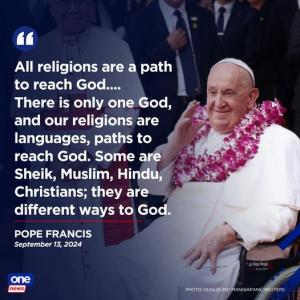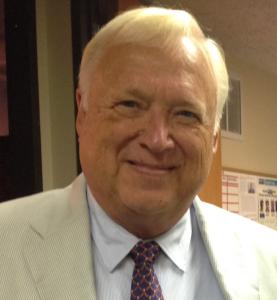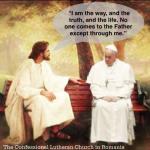Pope Francis vs Jesus as the Only Way, Part 1

What!? A new theological battle? Is it really Pope Francis vs Jesus? How could this conflict possibly happen?
At the Catholic Junior College in Singapore on September 13, 2024, His Holiness Pope Francis included in his address, Tutte le religioni sono un cammino per arrivare a Dio. That is, “All religions are path[way]s to reach God.” Here’s a slightly larger rendition of what the pontiff said.
“All religions are paths to God. I will use an analogy, they are like different languages that express the divine. But God is for everyone, and therefore, we are all God’s children….There is only one God, and religions are like languages, paths to reach God. Some Sikh, some Muslim, some Hindu, some Christian.”
The National Catholic Reporter responded with, “Ahem.”
“Basically, Christianity is true: All salvation is through Christ, alone, and the Church that Christ founded teaches everything necessary for salvation; other religions attain at best a partial and distorted understanding of God and the universe.”
Crosswalk Forums and others responded by quoting Jesus.
Jesus said to him, ‘I am the way, and the truth, and the life. No one comes to the Father except through me (John 14:6).
So, who is right? Francis or Jesus?
Many streams flow into the same sea

This contest – Francis vs Jesus — reminds me of the 1970s, when the Christian ecumenical movement began to lose the theological race to its competitor, religious pluralism. Advocates of religious pluralism reiterated the 19th century imagery of Ramakrishna and Vivekananda: each religion is a different path up the same mountain to the same divine top. At the top is Brahman, of course. Brahman is the ultimate reality posited by the Hindu tradition. I his 1893 speech to the Parliament of the World’s Religions in Chicago, Vivekananda used the stream metaphor instead of the mountain.
“As the different streams having their sources in different places all mingle their water in the sea, so, O Lord, the different paths which men take, through different tendencies, various though they appear, crooked or straight, all lead to Thee! … Whosoever comes to Me, through whatsoever form, I reach him; all men are struggling through paths that in the end lead to Me.”
You may call the divine “God” or “Allah” or “Thor” or “Ashtar” or “Gaia” or “The New York Yankees.” These are but different names for the one ultimate reality, called “Brahman” by our Hindu neighbors.
Religious pluralism: what are the options?
Within Christian circles and to some extent interreligious circles, I’ve identified three contending options: (1) confessional universalism; (2) confessional exclusivism; and (3) supraconfessional universalism. Each is an option a Christian might choose. It’s also an option for a Muslim, Jew, Sikh, or Daoist to choose (Peters, God–The World’s Future, 2015, Chapter 12).
You’ll notice that the way I just cut this pie into three slices is not the way my academic colleagues do. Most theologians who call themselves religious pluralists cut the pie into exclusivism, inclusivism, and pluralism.
Allegedly, according to religious pluralists, exclusivism is the view held by conservative Christians regarding non-Christians, according to which there is no salvation outside the church (extra ecclesiam nulla salus). Or, to say it another way, unless a person has taken Jesus Christ as his or her personal Lord and Savior, then he or she is excluded from salvation. Typically, the only religion put into the exclusivist camp is conservative Christianity. Non-Christian exclusivists are rarely given attention by pluralist theologians.

Inclusivism is an alternative Christian view which affirms that Christ is the only savior of the world and, in addition, non-Christians are included in Christ’s saving work. Or, to say it another way, Christianity is the one true religion; but no hell exists for non-Christians because of Christ’s atoning work. This is the second slice of the pluralist pie.
Pluralism — sometimes called “diversity”– represents a third option, according to which one supra-religious reality is said to underly all religious perceptions of the divine. Christianity, according to pluralists, represents only one historical or contextual perspective among many. Christianity is in no way superior to other perceptions of this single transcendent reality. Brahman is renamed the ‘ultimate’ or the ‘godhead’ or the ‘The Real’. Such a non-traditional term dons neutrality in the face of existing religious vocabulary. “The pluralist position is that there are many roads leading to the same goal,” according to Paul Capetz. “Buddhism, Islam, Judaism, and Christianity are merely different ways to salvation” (Capetz 2005, 63).
Now, we all like the taste of pluralism the best! Don’t’ we? That’s because the self-designated pluralists baked the pie and sliced it this way. According to this recipe, Jesus can be dismissed as an exclusivist and Francis welcomed to dessert with the pluralists.
Envoi
Francis vs Jesus. Such a split is unimaginable.
No doubt Pope Francis is motivated by a big heart to impute dignity to persons of many religions in Singapore: Hindus, Buddhists, Muslims, Christians, indigenous Malaysians, and such. Singapore is an amazing city-state in that multiple religious traditions thrive in a mutually supportive community.
In Francis vs Jesus Part 2, we will list three more realistic options for viewing the debate: confessional universalism, confessional exclusivism, and supraconfessional universalism. Click when ready.
ST 2023 Pope Francis vs Jesus as the Only Way, Part 1
ST 2024 Pope Francis vs Jesus as the Only Way, Part 2
ST 2025 What is Comparative Theology?
ST 2005 What is Justification by Faith?
ST 2006. Dicastery for the Doctrine of the Faith
2023 Parliament of the World’s Religions: Ultimate Unity
▓

For Patheos, Ted Peters posts articles and notices in the field of Public Theology. He is a Lutheran pastor and emeritus professor at the Graduate Theological Union. He co-edits the journal, Theology and Science, with Robert John Russell on behalf of the Center for Theology and the Natural Sciences, in Berkeley, California, USA. His single volume systematic theology, God—The World’s Future, is now in the 3rd edition. He has also authored God as Trinity plus Sin: Radical Evil in Soul and Society as well as Sin Boldly: Justifying Faith for Fragile and Broken Souls. He recently published. The Voice of Public Theology, with ATF Press. See his website: TedsTimelyTake.com and blog site, https://www.patheos.com/blogs/publictheology/ .
▓
References
Capetz, Paul:. 2005. “God and Religious Diversity: Toward a Theocentric Pluralism.” In Constructive Theology, by eds Serene Jones and Paul Lakeland, 60-66. Minneapolis MN: Fortress.
Eck, Diana. 2007. “Prospects for Pluralism: Voice and Vision in the Study of Religion.” Journal of the American Academy of Religion 75:4 740-750.
Hick, John. 2010. The New Frontier of Religion and Science. New York: Macmillan Palgrave.
Peters, Ted. 2015. God–The World’s Future: Systematic Theology for a New Era. 3rd. Minneapolis MN: Fortress Press.
Peters, Ted, Muzaffar Iqbal, and eds. Syed Nomanul Haq. 2002. God, Life, and the Cosmos: Christian and Islamic Perspectives. Aldershot UK: Ashgate.














